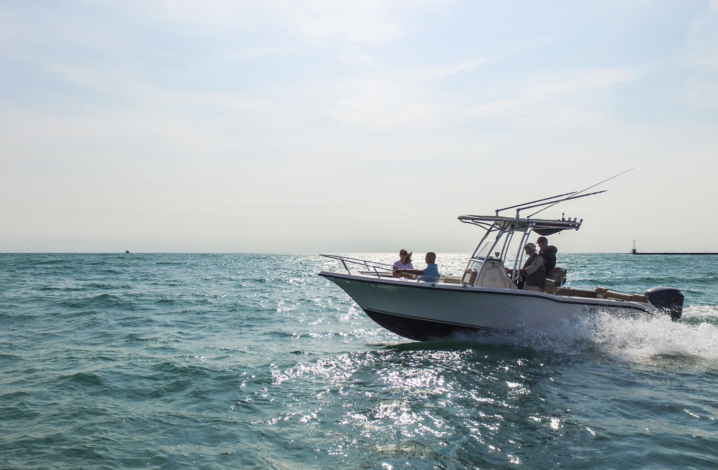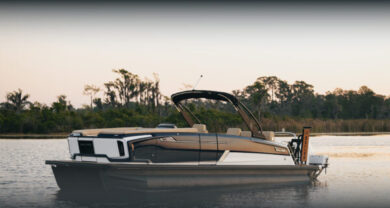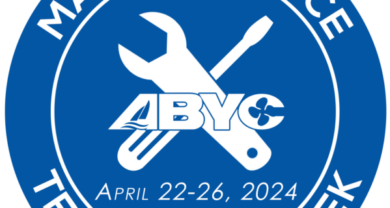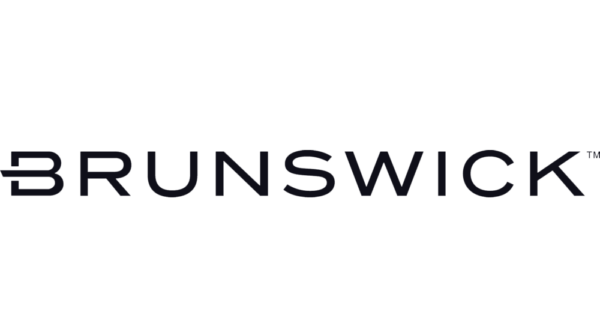NMMA, NOAA meet in Miami on proposed vessel speed restriction

Last week, members of the boating industry met with Janet Coit, Assistant Administrator for NOAA Fisheries, at the Discover Boating Miami International Boat Show to express their concerns about the agency’s proposed expansion of the North Atlantic Right Whale (NARW) Vessel Strike Reduction rule. This was the first time the Assistant Administrator had met with the recreational boating industry about the impact of the rule since it was proposed a year and a half ago in August of 2022.
During the meetings, Assistant Administrator Coit heard from an array of boating industry stakeholders, including small business boat manufacturers, anglers, and marine technology experts. Attendees voiced their concerns over the devastating impacts this rule would have on their businesses, the lives of their employees and customers, and the broader coastal economies. The members of the boating industry strongly encouraged a solution that focuses on the adoption of advanced marine technologies that would more effectively prevent vessel whales strikes than a blanket speed rule.
“We thank Assistant Administrator Coit for engaging directly with members of the recreational boating industry, and we appreciate the opportunity to show her the sophisticated marine technologies that can be implemented immediately to protect the North Atlantic right whales,” said Frank Hugelmeyer, President and CEO of the National Marine Manufacturers Association (NMMA). “NOAA’s proposed rule would have devastating impacts on hardworking American small businesses, their employees, and communities across the U.S. We strongly urge NOAA to work with the recreational boating industry to prioritize technological solutions that protect the North Atlantic right whale without jeopardizing the livelihoods of Americans.”
Concerns expressed to Assistant Administrator Coit during the meeting included:
- Technology: Sophisticated technology exists today that can detect and protect NARWs from vessel strikes. During the show, leading marine technology experts showed Assistant Administrator Coit exactly how the technology works and how it can be deployed on existing recreational boats.
- Economic Impact: The proposed rule puts more than 340,000 American jobs and nearly $84 billion in economic contributions in jeopardy. More than 95 percent of boats sold in the U.S. are made in the U.S., and approximately 93 percent of boat manufacturers are small business owners. Many coastal economies are built on recreational boating, fishing trips, and the hospitality industry that requires access to the ocean. This rule could have the potential to devastate these small businesses and economies that are still recovering following the pandemic.
- Data: NOAA’s data used in developing the proposed rule is fundamentally flawed and significantly overestimates recreational boating’s impact on NARW mortality while vastly underestimating the economic and safety impacts of the rule. Studies show that most fatal whale strikes are caused by large, ocean-going vessels over 260 feet. Further, in the proposed rule, NOAA casts no distinction between a 35-foot boat that drafts only 3 feet versus a massive oceangoing vessel that drafts 45 feet. Finally, it was impressed upon the Assistant Administrator that small, recreational boats are much more able to avoid whales due to the ability to quickly change course. Because recreational boats are likely to suffer a catastrophic event when they hit a whale, recreational boaters are highly incentivized to avoid whales or anything in the water that could destroy their boats and risk the lives of those on board.
- Boater Safety: Requiring small recreational boats to travel at 10 knots (11 mph) in the open ocean can put boater safety at great risk. Boats are safer when they are operated on plane because it affords boaters better visibility and the ability to navigate the waves, especially in poor weather.
“It’s a false choice to have to choose between commerce and conservation. Both can be achieved. The boating industry cares deeply about finding solutions that protect whales and boaters, and technology is the answer. After not being consulted in this rulemaking process for more than a year and a half, we are encouraged by this dialogue with Assistant Administrator Coit and hope NOAA will continue to engage with us to create a balanced solution,” said Hugelmeyer.




